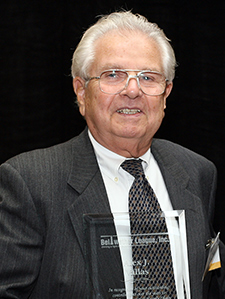 Alex J. Vallas (1932-2016)
Alex J. Vallas (1932-2016) Alex J. Vallas (1932-2016)
Alex J. Vallas (1932-2016)
Work Experience – Minimum 10 years of service within the healthcare supply chain (including a hospital or nonacute care facility, manufacturer, distributor, GPO, consulting or service company).
Work Performance – Specific accomplishments/achievements in their respective organizations, including expense management measures, committee involvement and management leadership.
Professional Activities – Minimum 5 years of active association participation (e.g., office holder, committee chair or contributor, organizing and running meetings, mentoring others) on the national, regional and local level; performed a minimum of two speaking engagements (national, regional, local, facility) and published at least twice (including writing an article or being interviewed by the trade media) during career.
Advancing the Profession/Industry Influence – Challenging the norms, contributing to the thought process, pushing the envelope in terms of moving the profession/industry forward. Examples include serving as a mentor either within his or her individual organization or on a national, regional or local level outside of his or her individual organization; internal inservices for the C-suite on supply management; pioneering new concepts and ideas that may or may not become reality; influencing those up and down the corporate hierarchy on the benefits of and promotion of sound supply management.
What are your thoughts about the mission and philosophy of Bellwether League Inc. and how do you feel about becoming part of the organization as an honoree and inductee?
It is commendable and, I believe, highly unusual to have a group with diverse connections join together to recognize individuals for their accomplishments, not for personal gain, but as a tribute to the profession of healthcare supply chain management for which they serve.
There is no greater honor than being recognized by one’s peers. Thus, I am extremely honored and pleased to be included in the inaugural inductee class of April 2008.
What attracted and motivated you to join the healthcare supply chain management field when you did?
Actually, it was quite by accident. I had served as Procurement, Property and Supply Officer at the American Embassies at Baghdad, Iraq, and Karachi, Pakistan. Upon resigning from the Foreign Service, I was hired as administrative assistant in charge of the emergency room (evening shift) at Massachusetts General Hospital in Boston. When I saw an ad in the paper for Assistant Purchasing Agent at New England Deaconess Hospital, I applied the experience of purchasing with that of healthcare on my application. I immediately became ‘addicted’ under the direction of Cliff Fisher, who was then Purchasing Agent, and active in the field of purchasing and supply. While working at New England Deaconess Hospital, I studied purchasing at Northeastern University.
For what one contribution would you like to be most remembered?
Promoting the concept of centralizing supply chain activities under one management authority for the purpose of introducing and implementing various systems, techniques and tools essential for the financial stability of the organization.
If you were to encourage people – either outside of healthcare or just out of school – to enter the supply chain management field and potentially qualify to be a future Bellwether League Inc. honoree, what would you tell them?
The potential for making a difference in healthcare delivery is still enormous. While much has been accomplished, there is still a lack of appreciation in many organizations related to the impact that effective supply chain management can have. One should not look at supply chain management in a narrow sense. Through the application of various systems and processes, the impact on the organization can be huge. Working as a team with other departments of the organization, the impact goes beyond cost reductions to improving patient care outcomes.
What is the one industry challenge you would like to see solved in your lifetime?
Developing programs that would improve healthcare delivery while reducing costs by establishing teams composed of physicians, clinicians, vendors, insurance carriers and supply chain managers that would analyze the impact of products and processes related to costs and outcomes. As a very simple example, under the current system, if a patient acquires a hospital-borne infection the hospital actually gains financially (though not in reputation) if the patient is readmitted. On the other hand, the patient, taxpayer, insurance carrier (and insured) are adversely affected. In many cases, vendors could assist by the introduction of products that actually reduce costs while improving outcomes. For example, inserting coronary stents (though proven recently to be over-utilized and overrated) to open clogged arteries. If vendor ‘X’s actual price of the stent is higher, but it has a better record of avoiding re-stenosis and readmissions, it is then the most economical and effective product. It should be remembered that it is not the supply chain manager’s function to save money, but rather to spend it wisely.